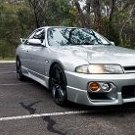Rb26 In A 32 Gtst
Announcements
-
Similar Content
-
Latest Posts
-
By Murray_Calavera · Posted
Oh dear. The panel beating needs to be done before the filler work. Do you have a photo of the dent before you started? Hard enough to not flex and only hit the high spots? What do you mean it was just temporary? -
Can u check this way it works for power supply?
-
These coils draw 10amps that what i read online
-
By nouveau_poor · Posted
I appreciate the detailed explanation, think I understand now. I spent the better part of last night reading what I could about shuffle and potential solutions. I had replaced the OEM twin turbo pipe with an alternate Y pipe that is separated further away from the turbo. The current one is from HKS and I had a previous pipe that was separated even further away, both have shuffle. I had heard that a divider can be welded in to the OEM pipe to remove turbulence, and figure that aftermarket pipes that are more separated would achieve the same thing. From what I read, most people with -10 turbos get shuffle due to their size, though it's a bit less common with -5s on a standard RB26. I think Nismoid mentioned somewhere it's because OEM recirculation piping is common in Australia with -5 cars. It seems that the recommendation tends to vary between a few options, which I've ordered in what I think is most feasible for me: 1. Retune the MAP or boost controller to try to eliminate shuffle 2. Install OEM recirculation piping 3. Something called a 'balance pipe' welded onto the exhaust manifolds. I don't know if kits for this are available, seems like pure fabrication work 4. simply go single turbo My current layout is as follows: Garrett 2860 -5s HKS Racing Suction intake MAF delete pipes HKS racing chamber intake piping hard intercooler piping, ARC intercooler HKS SSQV BOV and pipe Haltech 2500 elite ECU and boost solenoid/controller HPI dump pipes OEM exhaust manifolds HKS VCAM step 1 and supporting head modifications Built 2.6 bottom end All OEM recirculation piping was removed, relevant areas sealed off I'll keep an eye out for any alternative solutions but can get started with this. Only other question is, does shuffle harm the turbo (or anything else)? It seems like some people say your turbo shafts will explode because of the opposing forces after a while and others say they just live with it and adjust their pedal foot accordingly. -
By codygrimm27 · Posted
That worked out PERFECTLY! Thank you big time to JJ. He was able to swap me his stock diff. He drove all the way to me as well. Killer! Removal & install was pretty straightforward. The diff itself is HEAVY. So that’s a 2 man job. Man does the car drive nice now! Couldn’t have worked out any better 👌
-








Recommended Posts
Create an account or sign in to comment
You need to be a member in order to leave a comment
Create an account
Sign up for a new account in our community. It's easy!
Register a new accountSign in
Already have an account? Sign in here.
Sign In Now